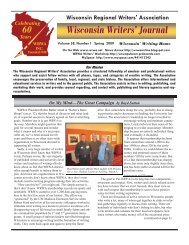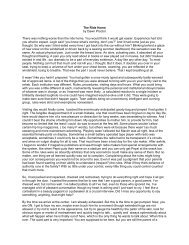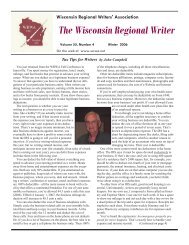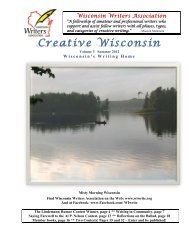2005 Winter - Wisconsin Writers Association
2005 Winter - Wisconsin Writers Association
2005 Winter - Wisconsin Writers Association
- No tags were found...
You also want an ePaper? Increase the reach of your titles
YUMPU automatically turns print PDFs into web optimized ePapers that Google loves.
Page 29Peggy Rozga’s “Daily Dozens,” by Jane Osypowski, Campbellsport“To think of yourself as a writer,you must be writing.” Not news toany of us, but Peggy Rozga gavedaily journaling a new twist in herpresentation, “The Daily Dozens.”Why do we journal? Peggy notedmany reasons but stressed that, nomatter why, there are two importantconsiderations. First, we need to“keep up the daily-ness.” It is best towrite at the same time and placeeach day, “so that our muse willknow when and where to find us.”Second, we have to be careful not tofall into, “oatmeal for breakfast today.”You know, those daily entrieswhere nothing special is happeningin our life, so we just list the mundanefor the sake of journaling, leavingno room whatsoever for inspiration.This is where the Daily Dozenscome into play. Instead of lookinginside, look outside and steer clear ofusing the “I” in entries.The basic process is to numberone through twelve in the left columnof the journal and to start writing.The list will be based uponwhatever we choose and will writeitself as things come to mind by associationor within the theme. Forinstance, in a writing exercise, weeach noted an item in the conferenceroom and compiled a list from there.My first entry was “the noisy airconditioner” and my last was “morepeople to visit—obligations” (innursing homes, from the previousentry). Through the dozen entries,my thoughts moved in a direction Icould not have anticipated.Peggy suggested that our journalentries be based upon sensory appeal—alist of twelve sights we seefrom our window, smells as we stepoutside, sounds or tastes or feelings.As we write, we should break freefrom sentences. At the same time,most entriesshould containmore than oneor two words.Strive to keepthem descriptiveand try toavoid abstractnouns.The list could be based on atheme. What about a sense of actionor the way words sound? From theDaily Dozens, we might discover anidea for a poem or a different way oflooking at something. Peggy saidthat writer’s block could become athing of the past. She reminded us to“Be a practical observer and you’llcome up with great descriptions,”and that each of us will “develop aprecision in what (we) see, hear,smell, taste, and touch.” We will allbecome better writers. #Pulitzer Prize? It’s All In Your Genes by Katherine Steffen, Lone RockWhat’s your purpose? What wereyou born to do? What can you dobetter than anything else? What canyou do brilliantly? What hidden talentsdo you possess?According to Donald Seymour,it’s all in your genes. All you have todo is listen to what they tell you.Donald urged a roomful of writerson a rainy Sunday morning duringthe WRWA Fall Conference to listen,follow, and find your talent.Then use it.Donald Seymour found his. Hisincredible life has allowed him torealize all of his dreams. Amongother accomplishments, Donald isthe retired CEO of Applied Biochemistsand the former Director ofCareer Guidance at Concordia University.He has done everything heset out to do: traveled the world firstclass, met foreign dignitaries, developedgroundbreaking software, andfell in love with and married <strong>Wisconsin</strong>’sMiss Congeniality. He andhis wife, Donna, founded the nonprofitVocational Guidance Instituteto research human capability.Author of The Key to Your UnknownTalent: A new discoveryabout you! Donald eagerly shares theanswers he’s found in over thirtyyears of research and now focuseshis life on helping others discovertheir natural inborn talent. Donaldreminds us that each of us is aunique individual, like no other inthe world. Or universe. No one elsehas your genes in your combination.One way to discover your innertalent? Donald suggests going to thelibrary and looking through the indexin the Dictionary of OccupationalTitles. The book lists everyoccupation. Something will jumpout, call you. Follow that. Listen.And make your own list.Your list willhelp with yourwriting in severalways. Donaldtells us it will,“inspire, removewriting blocks,enhance your creative intelligenceand problem solving capability, andmake subject research more fun.”Another added benefit of the list?What a wonderful resource for developingcharacters and inspirationfor new ideas.So hear that voice inside you, theone urging you toward what you areinterested in, what you love, yourpassion. Your dreams. Your purpose.Donald Seymour assures us thatsomething wonderful is waiting. Allwe have to do is listen. “Your life,”he says, “is what you make it.”So go out, grab hold, and make itgreat! #






